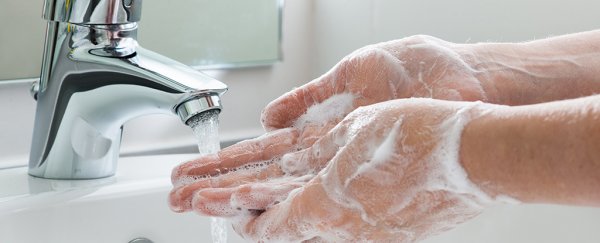While the use of antibacterial soap is beneficial in certain situations, for everyday use, they can end up doing more harm than good. That's the message from a growing number of studies casting doubt on the safety of these microbe-killing soaps, and now the US Food and Drug Administration (FDA) is demanding more data from the makers of antibacterial soap so it can make a final ruling.
These bacteria-killing soaps have been under close scrutiny for several years now, and have been banned in certain parts of the US. Some researchers believe their use is contributing to the rise of 'superbugs' - in other words, chemicals in antibacterial products are causing the bugs to mutate and become more resistant.
Add to this the evidence that antibacterial soap doesn't actually clean your hands any better than normal soap and warm water - at least not if you're only cleaning your hands for a couple of minutes at a time - and you can see why experts are saying it's causing more harm than good.
A study presented earlier this month to the US Endocrine Society found that mother rats exposed to triclocarban - a chemical most commonly found in antimicrobial bar soaps - was passed onto their offspring. It was also altering the microbiomes of both mothers and babies, which is a worry, because we're learning more and more about how crucial our internal bacteria are for our health.
Also under suspicion is triclosan, another antimicrobial widely used in hand soaps and many other products, from shampoos to cosmetics. A 2014 study found exposure to triclosan could make both humans and rats more susceptible to a potentially infectious type of bacteria called Staphylococcus.
More recent research has found triclosan affecting the microbiomes, diversity, and community structure of zebrafish.
If that wasn't enough bad news for antibacterial soaps, other studies are looking at their impact on the wider environment.
Two recent studies from Marquette University in Milwaukee, Wisconsin found that both triclosan and triclocarban interfered with microbial communities that break down sewage, reducing their effectiveness, and encouraged bacteria to become more resistant to drugs.
The FDA is expected to make a decision in September about whether these antimicrobials should be banned from all soap products. While they're technically safe, they might not be doing us or the environment around us much good. In the meantime, you could consider replacing the antibacterial handwash you keep in the kitchen or bathroom with just plain, old soap.
"We want to slow the proliferation of antibiotic-resistant bacteria so that our current antibiotics can continue to help medical patients," said one of the team from Marquette University, Dan Carey. "If using hand soap without antimicrobials can help, I think it would be worth it to try and change consumer behaviour."
